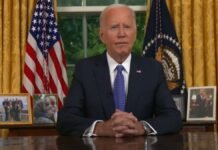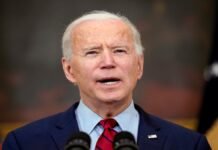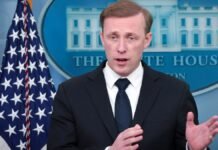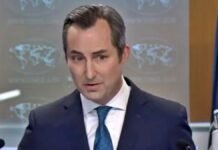
- US Defense Secretary Lloyd Austin has been hospitalized in the intensive care unit since January 1, but his condition was not disclosed to the public or President Joe Biden until last week.
- Austin, who tested positive for COVID-19 for the second time in August, underwent a minor surgery that led to complications and required intensive care.
- Austin apologized for the lack of transparency and said he took full responsibility for his decisions regarding his medical procedure.
- The secrecy surrounding Austin’s health raised questions about the readiness of the Pentagon and the national security implications of his absence.
Washington: US Defense Secretary Lloyd Austin, 70, has been hospitalized in the intensive care unit at Walter Reed Army Medical Center since January 1, but his condition was kept secret from the public and from President Joe Biden for several days, according to multiple sources.
Austin, who tested positive for COVID-19 for the second time in August⁴, underwent a minor surgery that led to complications and required intensive care, his press secretary John Kirby said on Saturday. Kirby did not specify the nature of the surgery or the complications, but said Austin was “stable and in good spirits.”
Kirby also said that Austin had delegated his authority to Deputy Defense Secretary Kathleen Hicks on January 1 and that he had resumed his duties on January 6. However, Hicks was not informed of Austin’s hospitalization until Thursday, January 6, by a senior defense official, who also said that Biden was not notified until the same day by his National Security Advisor Jake Sullivan.
Kirby said that Austin had been in regular contact with Hicks, Sullivan, and other senior officials during his hospitalization and that he had participated in several secure video conferences, including one with Biden on January 4. He also said that Austin had received regular briefings and updates on national security matters and that he had made several decisions and approved several actions during his absence.
Kirby said that Austin’s hospitalization did not affect the operations or readiness of the Pentagon or the military and that there was no disruption in the chain of command or the civilian control of the armed forces.
Austin’s apology
In a statement issued on Saturday evening, Austin apologized for the delay in disclosing his hospitalization and said he took full responsibility for his decisions regarding his medical procedure.
“I believe I could have done a better job of properly informing the public,” he said. “But it is important to note that this was my medical procedure and I take full responsibility for my decisions regarding not disclosing it.”
Austin also thanked the medical staff at Walter Reed for their care and professionalism and expressed his gratitude to Biden, Hicks, Sullivan, and other colleagues for their support and understanding.
He also urged everyone to get vaccinated and boosted against COVID-19, saying that his fully vaccinated status, including two booster shots, had helped him cope with the virus and its complications.
“I will continue to consult closely with my doctor in the coming days and follow his advice on when I can return to the Pentagon,” he said. “In the meantime, I will retain all authorities and plan to maintain my normal work schedule virtually from home.”
Transparency concerns
The secrecy surrounding Austin’s health raised questions about the transparency and accountability of the Pentagon and the Biden administration, especially at a time when the country is facing multiple national security challenges, such as the tensions with Russia over Ukraine, the nuclear talks with Iran, and the rise of China.
Some lawmakers and experts criticized the Pentagon for not informing Congress or the public about Austin’s hospitalization, saying that it violated the trust and confidence of the American people and the allies.
They also questioned the readiness and contingency plans of the Pentagon and the military in case of a prolonged or permanent absence of the defense secretary, who is the second in the line of succession to the presidency after the vice president.
They also pointed out the potential risks and vulnerabilities of having the defense secretary conduct sensitive and classified meetings and communications from a hospital bed, where he could be subject to hacking, surveillance, or interference.
Some also expressed concern about the health and well-being of Austin, who has a long and distinguished military career, but also limited experience and public record on many pressing global issues, such as China, climate change, and cyber security.
They also wondered why Austin did not disclose his hospitalization sooner, or why he did not temporarily transfer his authority to Hicks or another senior official until he fully recovered.

Secretary of State Antony Blinken, who is traveling in the Middle East, defended Austin at a news conference in Qatar on Sunday, saying that he was “doing well” and that he had been “fully engaged” in his duties.
Blinken also praised Austin as a “remarkable leader” and a “trusted friend” of Biden and said that he had played a critical role in the administration’s foreign policy and national security agenda.
Blinken also said that he had spoken with Austin on Saturday and that he looked forward to seeing him back at the Pentagon soon.

















































